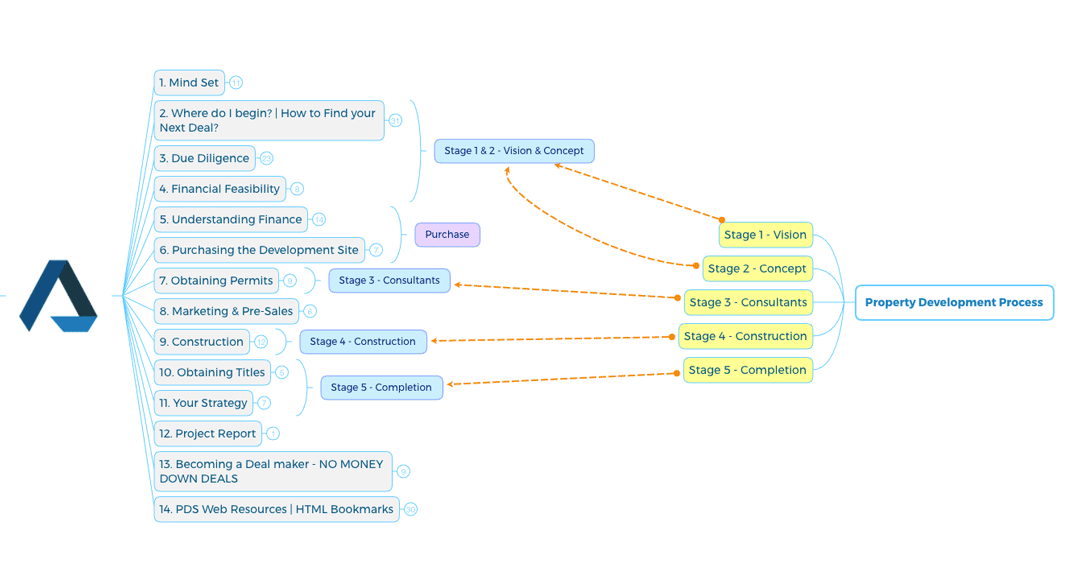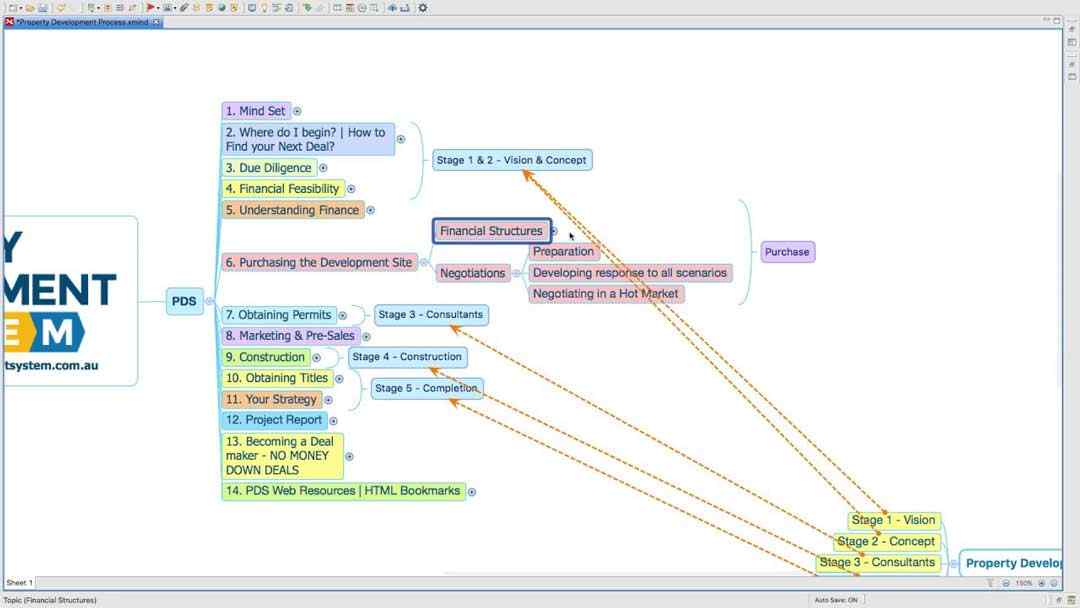Escaping the drudgery of a 9-to-5 job and becoming your own boss by developing residential property is the dream of many. Rather than assisting in the growth of someone else's business, why not pursue your own wealth-creation goals.
Though risks are high in real estate development, so too are rewards. There are thousands of success stories out there, and mine is one of them. You could be a successful property developer and earn millions of dollars by working on the right strategies.
Start your journey by understanding the comprehensive property development process.
What Is Property Development Process?
What is real estate development process?
Property Development Process are a series of steps that property developers taken in order to find, stack and execute a property development project. An effective Property development process would include detailed steps that take you from the very first task of finding a development sites, conduction due diligence and financial feasibility on the project, and all the way to completing your property development project.
Let’s look at the complete property development process aka real estate development process and all the steps that should be part of a property development course for beginners. Let me show you the complete property development process, that I teach in detail in my property development course I have packaged into a process driven Property Development System.
Conventional Property Development Process Vs "Process-Driven" Property Development System
Conventional property development process dictates that there are only 5 stages in property development process. However, from my own experience I have found that a complete property development process has lot more steps that are required to be completed in order to deliver a profitable property development project on time and under budget.
A developer must have a clear understanding of all the steps involved in the property development process. There are over 10 phases in a "process-driven" Property Development System.
5 Stages Property Development Process:
Stage 1 – Vision
Stage 2 – Concept
Stage 3 – Consultants
Stage 4 – Construction
Stage 5 – Completion
The above are the 5 stages of property development process, as taught by most property gurus. I know this because that's what I was taught as well. However, when I actually got into doing property development, I figured that there are so many different moving parts between these 5 stages of property development.
"Considering only these 5 stages will be like talking about WHAT TO DO, rather than HOW TO DO property development".
Let me explain in the Real Estate Development Process video below:
Property Development Process: Vision
You start the real estate development process with a vision...
you develop a concept of what you're going to develop...
you hire the right property development team...
you get the right property professionals...
you get accurate reports...
and then you contract out the construction to a builder to construct the development for you.
Feels like a lot of work?
Yes, it is!
However, with the proper training and decisions, it can be a profitable endeavour.
Once your development project is complete, you either sell the ones you've developed or hold them for long-term investment.
That's all fine, but for someone new getting into property development and thinking that it's as easy as this, 1, 2, 3, 4, 5, I think that would be unfair to the beginners entering the property development industry.
However, it would be a lot better if you could see the complete picture before getting into the project or property development. A term called 'event sequence model' means a simplified approach to property development that envisions a timetable from inception to completion comprising several stages shown above.
All I'm trying to do in the video above is to show you what the complete property development process looks like in its entirety.
There is no hard and fast rule that you must follow the method in the same order as described above. Activities can run in parallel or be arranged to fit the needs of the project.
For example, marketing may begin early if the developer wishes to achieve advanced sales off-plan or pre-lets. You must go through the process of becoming a property developer to make the best decision.
I have put together many courses in property development in various bite sizes, which I collectively call my Property Development System.
I have developed these property development courses over the last few years of doing developments, reading books, going to seminars and of course documenting each & every step over the course of all my property development projects that I've done personally with my own money.
The Complete Property Development Process Includes
14 Real Estate Development Phases
Here is the complete property development process that I know and teach in detail in course. The image below shows a break down of conventional process into further details stages or phases of property development. Without these extra stages your property development process is incomplete.
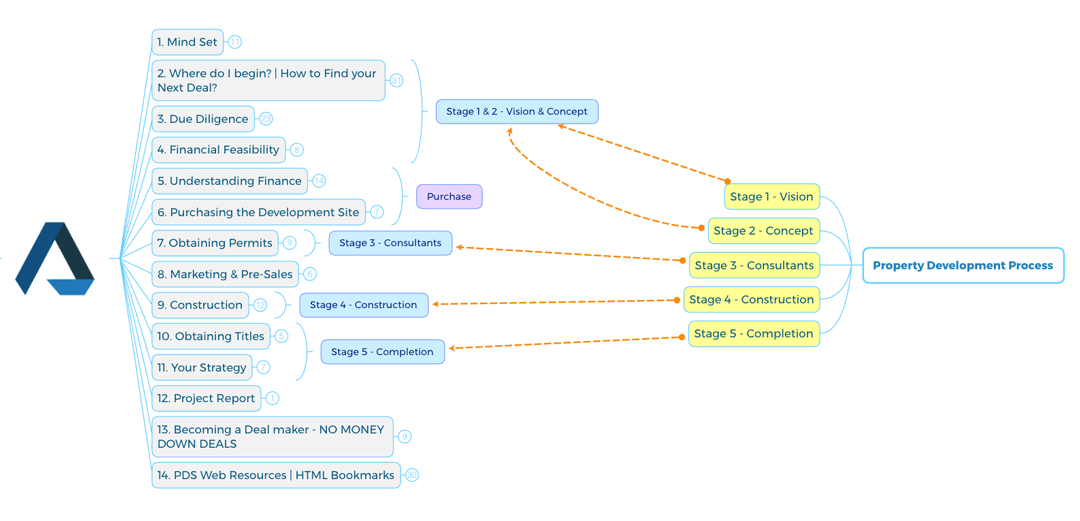
Property Development Mindset
The One Thing You Need Before Understanding Property Development Process
Before I get into where you begin, due diligence and feasibility are part of the vision and concept.
I've broken it down into further steps that you can take as you go along. I think the most important thing for any property developer is to be able to main the right mindset, and if you haven't got the right mindset, you'll quit halfway through, and you end up wasting your money, wasting your time, and I don't want you to do that. You must have the right mindset to be able to go through The Complete Property / Real Estate Development Process.
I say complete because you will get caught out if you skip the property development phases or stages.
Winners Vs Losers
There are people who are winners, and there're people who are losers, but there are also people who haven't learned how to win yet.
You can't categorise them into winners and losers, as black and white. They're people who have that greatness within themselves, and all they need is the right system, all they need is the right education, all they need is somebody holding their hand and telling them what needs to be done, and they'll go out and do it.
You've got to make sure that you identify yourself with what kind of person you are. If you are that person who wants to learn and get ahead, then your must invest your time in learning property development the right way.
There is a saying...
Circumstances don’t make a man, they only reveal him to himself.
Certainty and Uncertainty in Property Development
This quote is appropriate for property development because once you get into a development project, that project will reveal you to yourself. There are so many decisions that you'll have to make.
There could be times when you won't be 100% clear about what will happen or what will not happen. What I mean here is compared to a 9 to 5 job, where you go to a job from 9 to 5, and no matter what you do there, you know that you will get the same paycheque in your bank account next month. There's a degree of certainty.
In property development, there's a fair bit of uncertainty. I embrace it because that keeps me on my toes and keeps me sharp, and keeps me from slacking off. A lot of people don't like that.
If you are one of those people who craves certainty, so you know what’s going to happen next month, then property development is not going to be a good fit for you.
However, if you can embrace a bit of uncertainty, you can pull your socks up and say, "I'm going to do this no matter what happens", - then you can do exceptionally well in property development. Suppose you are willing to spend the extra time required to get educated property development and get an excellent understanding of property development.
In that case, there is nothing that will stop you from becoming a property developer. My property development course has everything that you need to become a property developer. If you are starting, start with a short property development course.
It's up to you, but make your mind and ask yourself how do you see yourself. If you don't have confidence in your knowledge about property development, you will struggle in this industry.
There's a lot of things that you have to assume and allow for before you get into a property project. When you're in a job, yes, there is a lot of uncertainty that you deal with. However, that uncertainty or the consequences are borne by the company and not by you.
In other words, if things go wrong, they don't hit your back pocket; they hit the back pocket of the company you work for.
If you're the kind of person who doesn't like to take that responsibility or do that, I would not worry about watching the rest of the videos in this article. You will need to find something that suits your personality.
On the other hand, if you are willing to take action...
if you are the kind of person, who can take on challenges...
if you're the kind of person who can troubleshoot...
if you're the kind of person, who is resourceful...
I would say property development can be the most lucrative field for you compared to any other field. Make sure you've got that right mindset.
Finding Your First Development Project
There are a few things that come before having a vision for your site. And that is actually finding the right site for your first development project. What is more important is to be able to get an understanding of the complete property development process.
Listening For Property Market Signals
Understanding of property market signals that give you the pulse of the market is very important. There are a lot of things that you can do when you hear these signals in the media, and this is what will separate you from other property developers. Because understanding these signals about the property cycle helps you make better decisions when selecting your first site for your first development.
Due Diligence
For you to be able to get to your vision and concept stage, you got to do full scale due diligence on a property. Which is basically determining highest based possible use, which is your vision. What it does is it gives you the ability to determine how many townhouses that you can put on a block of land or how many apartments you can put on a block of land and so on.
Site Selection / Analysis
How do you actually select the site? This stage, deals with understanding town planning zonings and overlays. The next step is collect data and analyze all this data about your site so that you can make an informed decision.
Spatial Analysis
Spatial Analysis is basically you looking at your suburb from a birds eye view and understanding how it sits with respect to all the other properties that surround it.
In my property development course, I teach you how to plot all your sales data on maps so you can see what they look like and also determine the end value of your townhouses, apartments or units that you are going to develop. It’s very similar to what the property or real estate valuers do.
I follow the same system, I get all relevant sales data and I plot it all there and I look for evidence that helps me support my decision of whether I’ll be able to sell my townhouses for say, 600K once they are complete.
My decision is based on actual facts, things like finding evidence that tells me yes, because 2 blocks from my target site, there were townhouses which were 3 bedroom, 2 bathroom that sold for 600K. That’s only about 700 meters from my development site. Then I figure out, whether or not this is achievable. Exercises like these, help me solidifying my assumptions and having a visual view of what it looks like, gives a totally different perspective.
Location Analysis
When you’re a developer you don’t go out and keep doing a full scale financial feasibility on every residential property development project that comes on your table. It’s counter productive.
You want to have mechanisms in place where you can quickly conduct a 2 minute feasibility on a project to be able to determine whether or not it is worth your while to proceed from this point on.
Things like reading architectural drawings. I got this module in the course because when I started, I couldn’t read the drawings and I had to look at them and scratch my head?
Over a period of time, you get an understanding of the different architectural symbols that are used on drawings.
Due Diligence Checklist And Risk Management.
This is all part of due diligence which unless you go through all the previous steps about actually finding the site for your development project & due diligence you won’t be able to develop your vision and concept, because these 2 Stages will actually answer all your questions so you can develop the vision and concept for your development.
You are missing out if you haven't yet subscribed to our YouTube Channel
Smart Feasibility Calculations
Financial feasibility is the corner stone of property development. very important. Before a project starts, I do 2 sorts of financial feasibilities. I’ve designed a Smart Feasibility Calculator I use 90% of the time to vet a project in under two minutes. And I have an advanced Property Development Feasibility Study - Software, I use to do a full-scale feasibility on a project.
The Smart Feasibility Calculator gives me an overview of the property development profit with 80% accuracy - giving me enough information to make an informed decision. Vetting a project quickly to determine the property development profit quickly, is an important step towards completing the VISION STAGE of property development process.
The next stage in the conventional property development process is consultants i.e. your property development team or property professionals who help you with all sorts of building and construction permits, reports and drawings. But hang on, there's a lot of stuff involved with understanding finance and being able to purchase development site.
So, let me explain you a few things before you even get to the consultants. You've got to first be able to sort your finances. As part of sorting out your finances, it is important that you do a financial feasibility analysis. Conducting a feasibility will help you answer two crucial questions:
- How much money can you borrow? and
- How much do you need to do your first development? aka Developer's Equity Contributions.
If you've done your feasibility right, you should know exactly how much money will you need to chip in from your own pocket, to complete your first property development project.
Development Finance
Development finance also works in different stages. There are different kinds of loans, and there are so many lenders in the market. So it is imperative that you have a good understanding of what are these lenders looking for? The kind of loan that you can get and the serviceability requirements.
Development Finance: Stage 1
Land Finance to settle on the block of land or development site that you wish to develop. This usually occurs, either after you have signed a contract of sale or have already purchased or settled on the land. Now is the time, that you engage your property development team to being the planning process.
Development Finance: Stage 2
Construction loan is usually a commercial loan & is not dependent up on your serviceability alone.
Development Finance: Stage 3
Finalise stage of development finance is, the post completion finance required after the construction is complete. Post completion, you can refinance and hold a couple of apartments or a townhouse that you've just developed and acquired at cost. Maybe you've sold four of them and you've held two, and all that has to be refinanced back into a retail loan.
This understanding is required prior to getting into your development project. So that know what's going to happen when you reach the construction stage and what's going to happen when you reach completion, specially, if you're planning to hold the development that you're developing.
Valuations
When it comes to valuations, you also need to understand why getting a favourable valuation is essential? The different types of valuations, how to get a fair valuation, understand the various valuation methods, and what the valuer looks for? You can also get desktop valuations from multiple free and paid sources.
The property development valuation consists of 5 different methods. That are -
- The investment method;
- The comparative method;
- The contractor's test (a cost-based way)
- The profits method
- The residual method.
Among all these, the most important one is residual valuation, which you will use to calculate your commercial development project's gross realisation value (GRV) or gross development value (GDV).
Residual Valuation
The property development process usually involves the development of new buildings. Thus you will be evaluating the value of your development in a residual appraisal.
It is a well-known property appraisal method for determining the viability of development ideas. With this method, it is simple to calculate the increased capital value of the land as a result of the projected development.
Let's do some math...
Property Development Process - Residual Valuation Example
The completed gross development value (GDV or GRV) of a project is the starting point for the residual valuation. Let's understand this with an example of GRV $10 million. After deducting the costs, which include the developer's profit, the land value is determined.
The overall costs in the case below are $5 million, which is subtracted from the GDV to leave a residual sum of $3.5 million for the land. Both sides of the equation appear to be in balance, and the developer seems to have made a wise decision in purchasing the site for $3.5 million. In this scenario, it is estimated that the development will take two years to finish and sell.
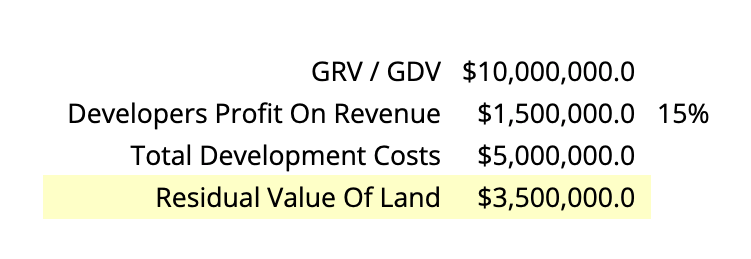
If you want to master the complete property development process with more such real-life scenarios, subscribe to any of my property developer courses. I guarantee you will never regret your decision.
Calculate Land Value
The basic formula for residual value reflects the fact that land is typically the unknown residual element:
GDV – (building costs + profit margin) = land value
Calculate Profit Margin
If the land value is known, then there is a change in the residual equation to calculate the profit margin:
GDV – (building costs + land value) = profit margin
Site Acquisition
With Site Acquisitions comes a requirement to understand the best structures that you need for your development. Get the right advice from your accountant before deciding on the type of structure you will use for the development, often referred to as the development entity.
Make sure that you get a good understanding of what's involved based on your long term plan after the development is complete. If you don't know your long-term plan after the development is complete, you might end up with a structure that will not help you save tax or help you with asset protection.
I would suggest that you go and talk to your accountant and make sure that you've got asset protection built into it and have an appropriate structure that can help you minimise tax legally.
Negotiate for Advantage
Negotiations are a very big part when you're purchasing the site. It could be negotiating the price, it could be negotiating the terms, it could be negotiating the time that you require for settlement which is basically part of the terms and special terms and conditions that become part of your contract of sale. So you have to prepare for these negotiations. You've got to develop your responses to all different scenarios. You must understand how to negotiate in a hot market as well as how to negotiate in a down market.
As part of my property development course, you also get my Negotiate for Advantage course in property negotiations.
Property Development Team
Consultants - which is stage 3, as per the conventional property development process, get activated now, after you have secured the development land or site that you are going to develop. You need to leverage off your property development team to obtain permits & all sorts of approvals from government bodies, councils and or industry watch dogs.
Construction is a complicated industry with lots of rules, regulations and compliance. Leveraging off of specialised consultants is the only way you will be able to complete your development.
For this, you need to understand different stakeholders and their roles in the property development process.
Get The Edge Now!
Discover the transformative power of our FREE EDGE platform and
unlock a world of opportunities at no cost!
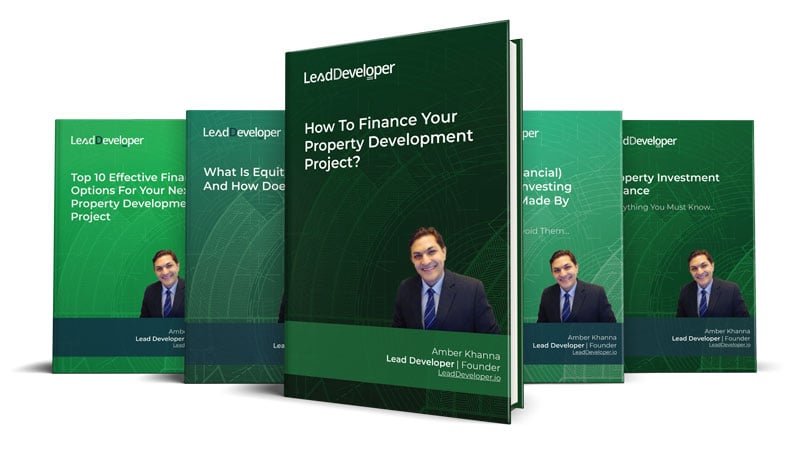
Your Real Estate Toolkit Awaits!
Free eBooks, Courses & Feasibility Suite Trial—Join Today!
✓ Unlimited FREE Trial: Experience the full power of our Feasibility Suite with hands-on demos
—explore without limits, no time pressure & without commitment or credit card!
✓ Learn from Success: Dive into real-life case studies for practical insights.
✓ Engage, Inquire, and Innovate: Ask questions, request features, and engage in lively discussions.
✓ Showcase Your Projects and Gain Insights: Share your projects and get personalised feedback.
✓ Free Resources Galore: Access a treasure trove of free resources,
eBooks & courses to keep you informed.
✓ Exclusive Training: Enjoy members-only training to sharpen your skills.
Role of Stakeholders in the Property Development Process
No two developments are the same, and thus there is always an involvement of a range of professionals or stakeholders in the real estate development process.
Who are the stakeholders?
The term "stakeholders" in the real estate development process refers to anyone interested in a project and can influence its success. It is a person or persons who impact the property development process or are affected by it. The role these property development professionals play will be different each time.
The "stakeholder map" below depicts the type of stakeholders and their involvement in the property development process.
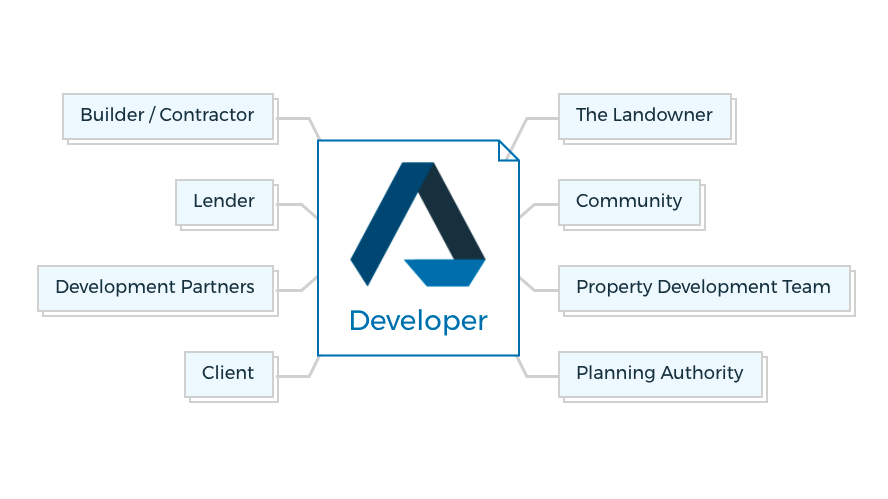
Property Developer
The Property developer here could be a trade property developer or an investor property developer. You could be one by signing in for my FREE Property Development Course Online.
The professional team of a property developer can vary depending on the type of real estate development. Still, in an extensive commercial or residential development, the core professional team would typically include a project manager, an architect, quantity surveyor, valuer, planning consultant, construction manager, structural engineer, services engineer, landscape architect, and possibly a highways consultant. I have revealed the secret of becoming a property developer in just 10 easy steps in my blog.
The Community
Local people, businesses, and organisations will tend to generate opinions on any significant development ideas, and they will voice their concerns to the local government during the planning consultation phase.
Local opposition to eco-town plans, wind farms, and airport expansions demonstrates that local opposition is alive. While local opposition does not necessarily result in a proposal being rejected by the local government, it might force developers to reconsider or relent on certain scheme features.
So, that was all about the stakeholders and property development team. Scroll down and explore the remaining stages of a property development process.
The Local Planning Authority
Local planning authorities in the United Kingdom and other nations have many 'hats' to wear in real estate development.
Any country's LPA has policies in place that it uses to negotiate with developers to create a policy complaint scheme. LPAs frequently arrange planning agreements with property developers to establish 'planning obligations.'
In addition, the LPA has a legal obligation to consider objections and explain the weight attributed to them in the decision-making process.
The Client
When a project is speculative, the client's concept becomes imaginary. In such a case, I recommend constructing a building with the broadest potential market appeal, visually appealing, and located in a popular area.
When a client, such as a landowner, a government agency, a business person, or a funding institution, is involved, the real estate developer will work on a more detailed brief.
Development Partners
When development is challenging and entails a certain amount of risk, specialised development partners may be required. The involvement of development partners is most common in the redevelopment of brownfield sites.
Your development partners could be engineers, regeneration agencies, housing associations, mentors, and sometimes the landowner. Development in partnership has the potential to spread the risk between parties.
For the ultimate success of your real estate development projects, I have created personalised mentoring programs. Take this 360-degree program to put together your first deal in a profitable way.
Lenders
Property development is funded either by banks or financial institutions (funds and insurance companies).
After assessing the risks involved in the real estate project, banks usually give short-term financing to the developer. It could be reflected in the interest rate charged by the bank. In the worst-case scenario, a bank would consider its own exit strategy if it had to take possession of a site because a developer had defaulted on a loan.
A fund might employ a developer as a project manager to oversee the development of a property it has purchased. In certain situations, a financial institution will have significant control over a developer, who may have to accept a smaller profit margin in exchange for the certainty offered by an institution's involvement.
Take a smart move and switch to a no-money-down property development project with me.
Builder / Contractor
The contractor is responsible for the building's construction and may hire subcontractors. For large projects, twenty to thirty subcontractors may be involved whose contributions are coordinated by the main contractor or project manager.
The procurement process and the type of building contract used will determine the relationship between the main contractor and developer.
The Land Owner
In some cases, the developer could be the landowner also. While in a town centre retail scheme, the local authority could be the landowner. Landowners may have agreed to enter into property option and conditional sales agreements with developers, in which the developer undertakes to execute the work involved in obtaining planning consent.
Design and Product Fit
These days, almost all living / working spaces get designed keeping in mind the environmental sustainability cost effective design. Your property development team will be able to guide you through this process. There are certain minimum standards that must achieved for by your development team in order to comply with various regulations.
Here is the 3rd Video that continues to explain the complete Property Development Process
Marketing And Sales
Marketing is very important specially post GFC, the rules of property development have changed. These days lenders and banks want to transfer all the risk to the borrower and or make sure that their worst case scenario is never a loss situation. To achieve this, lenders will often force pre sales upfront. Marketing can commence after you've got your planning permit or development approval. It has to kick in early, because banks will not fund the construction loan, unless a certain percentage of their debt is covered by pre-sales i.e. actual signed contracts.
Construction
You don't have to be construction contractor or a builder to be property developer. All you need to have a thorough understanding of the types of contracts, how to select different contractors, the tender process, what should be included & or excluded from the building contract, your obligations before construction commencement, during construction and post construction. What you can't miss is understanding the logic behind the cost of construction.
Cost of Construction
The cost of construction usually depends on several factors such as size, design, quality of materials, type of building and many more. You may face an increase in your development cost if there is a need to improve site access.
At this point in the property development process, construction costs are often analysed through comparison. Some online databases and sourcebooks distil costs from previous building contracts for various types of buildings. As a result, a construction cost per square metre can be calculated and applied to the gross interior floor space of the structure envisaged (measured between the internal faces of external walls).
Things You Need To Do During Construction?
You need to understand, how to file progress claims, deal with retention clauses, builders and defects liability period, insurances required by you etc. There are so many different things involved here because when the construction kicks in and there are progress claims, you will need to deal with a Quantity Surveyor appointed by your lender.
Obtaining Titles
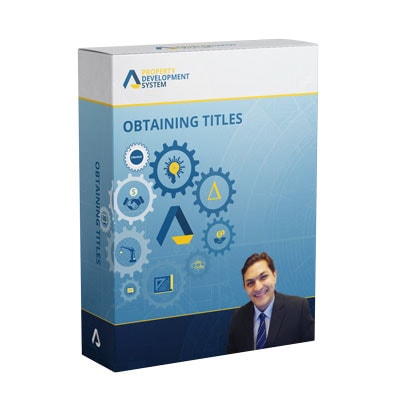
The other thing that's very important while the construction is still going and it's not complete yet is to be able to get your title ready in time because ideally, you want your titles to be ready. Say for example you are building nine apartments and your construction is expected to complete in three months time. You've got to get in touch with your land surveyor or certifier or an authority that is in-charge of issuing titles on new developments. You will need to have this processes initiated in time so that as soon as your development is complete, your titles for the newly developed units are ready to allow your pre sales to settle ASAP.
You need to stay on top of this process, mainly because at the end of construction, you've drawn down 100% of your construction loan, which in our example of 9 apartments, is a big amount and your daily interest can range from $400 to $600, to $1,000 a day, depending upon the size of your development. So you need to make sure that your pre-sales can settle as early as possible to minimise interest costs and pay down the debt.
Property Development System
This is where the conventional property development process ends. However, I found that for property investors, there are some extra steps that are required. From my own experience, I have found that these in between steps are not just important, they are CRUCIAL to get an understanding of the property development process.
Here's the final video explaining the extra phases in Property Development Process over and above the conventional development process.
What's Your Property Investment Strategy?
Before You Can Think About Your Property Investment Strategy, Let Me Explain My Thumb Rules For Property Investment:
- Never buy an investment property at retail price. If you are a developer, you have the skills and knowledge required to get your investment properties at cost i.e. not paying for someone else profit margin.
- For me to hold a property or a townhouse or an apartment after I've developed it, it must be either neutral or positive. I don't believe in carrying on unnecessary debt, specially for investment stock. Your investment property should not cost you anything out of your pocket to hold it.
As a property developer you can roll your profit as equity, hold it, get the property refinance, or get a line of credit on it, and so on. So that you can use equity again for another project and then you can come back and repeat the process all over again. So, this is what strategy is and this is what I cover in my course in the Property Development System.
MEGA DEVELOPMENT COSTS CHECKLISTS
End-To-End Property Development Cost Checklists
Includes both hard and soft costs, as well as detailed residential construction & renovation costs, so you never miss anything.
Project Report
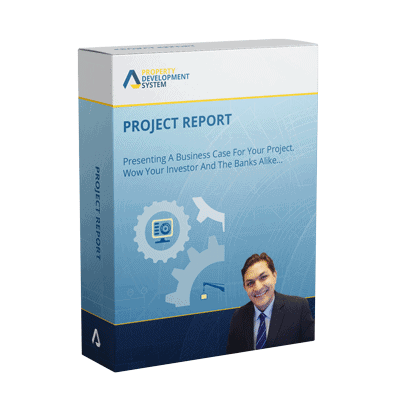
Three reasons you need a Project Report for your Development
- It serves as a checklist for me to make sure that I have a business case for my property development project. While putting it together as a business case, I am forced to back all my assumptions with facts and figures.
- The report tells me lender that I am thorough with my research and business case, giving them the confidence that I know and understand the complete property development process.
- It helps to attract property investors who are looking to invest in property development projects.
This is all part of doing no money down deals or creative deal making. In my No-Money Down property development course, I explain how I started as a property developer doing no money down deals. In fact, the five deals that I've done in the past, I've only had one project where I actually put my own money, and all the projects were in some way, shape or form we no money down deals for me.
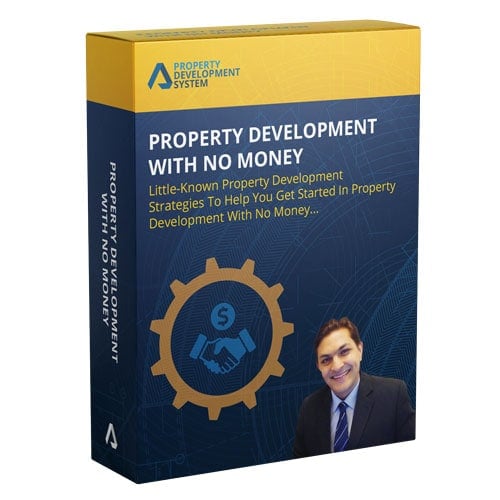
In my No Money Down Property Development Course, I talk about how you can acquire the skills, resources and education so that you become that go-to person with whom everybody wants to make a deal. Everybody wants them to work on the project because they know that they have the skills and the ability to deliver the development project. There are no clever strategies because all the different kinds of strategies that used to work in the past don't anymore.
All strategies that I teach about doing no money down deals is about you becoming that person and having that knowledge and access to the resources and the skills and the tools so that your investors know what you're talking about and they want your to develop with them or for them.

